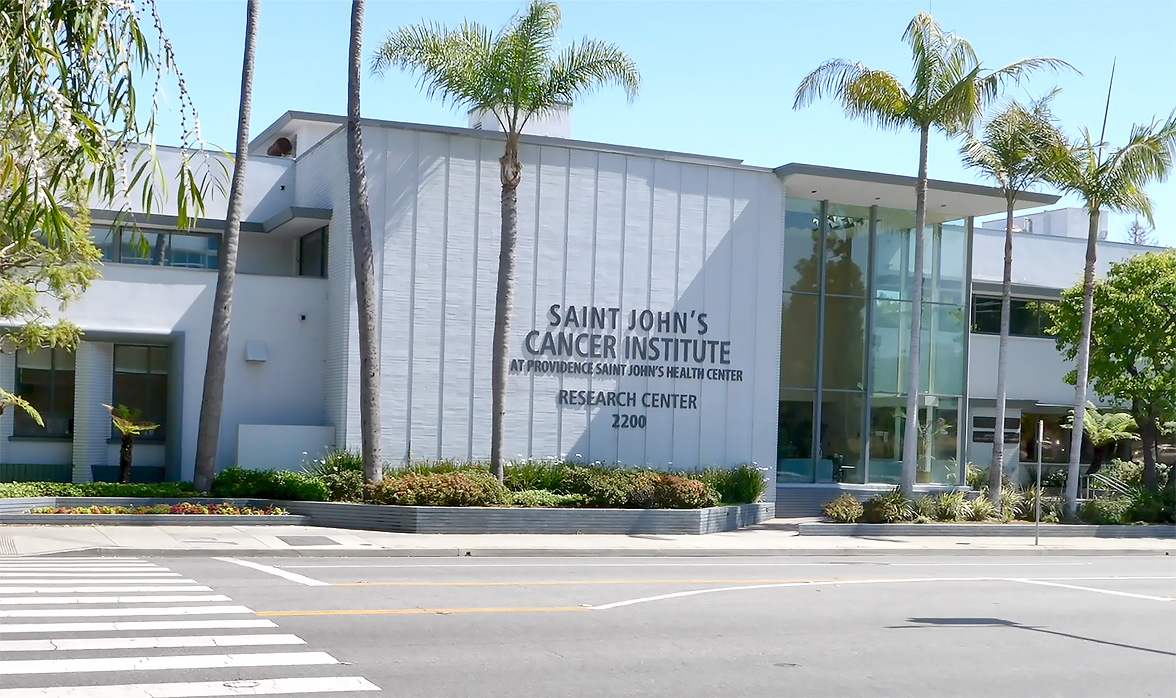The latest research into skin cancer treatments has always been fundamental at Saint John’s Cancer Institute.
Beginning in the 1970s, Donald L. Morton, MD, began collecting specimens and clinical data for his patients, first at UCLA and then continuing here at the Saint John’s Cancer Institute at Providence Saint John’s Health Center (PSJHC).
Saint John’s Cancer Institute maintains a unique bank of frozen or paraffin-embedded melanoma specimens collected since 1971. This specimen repository is linked to our historical database, an information system that was begun in 1971 by Dr. Donald Morton and Dr. Robert Elashoff, and now contains records for more than 15,000 melanoma patients.
The specimen repository includes sera, lymphocytes and tumor cells, tumor tissues and normal tissues, and cell lines. There are more than a million vials of sera and almost 150,000 vials of lymphocytes for cellular assays. Serial serum samples obtained from patients during regular clinic visits or according to multicenter trial protocols enable the immediate study of the relationship of tumor markers to the course of disease. Many specimens are linked to extended follow-up data and clinical outcomes, making them invaluable for correlative studies. The annotated specimen bank and electronic clinical database are used in tandem for prospective and retrospective investigations of prognosis, recurrence, and tumor biology. All specimens and linked data are coded to preserve donor confidentiality.
The repository’s unique features include:
- Empowering users to create aliquots
- The ability to perform assay testing on a range of different specimen types
- Automated routing of specimens to various labs for testing
- Extensive cross linking with clinical trial data
- Built in IRB consent compliance
- Advanced query and reporting capabilities in order to provide investigators with efficient access to the data they need.
June 07, 2017 – Saint John’s Cancer Institute’s melanoma study published in prestigious New England Journal of Medicine
Twenty-five years after a groundbreaking discovery at the Saint John’s Cancer Institute regarding the early diagnosis of melanoma, high-level research continues to advance treatment options for the potentially deadly cancer in its earliest stage.
Today, the New England Journal of Medicine published results of the latest study in this ongoing research at the institute, which is affiliated with Providence Saint John’s Health Center in Santa Monica.
The randomized study found no difference in survival rates related to melanoma for patients whose cancer had spread to the lymph nodes and immediately had them removed, or those who underwent regular ultrasound observation to monitor fluid draining from a tumor to the lymph nodes. The study concluded that delaying surgery while continuing observation is an acceptable option, said Lisa Van Kreuningen, director of clinical research operations for the cancer institute.
The advantage of observation over surgery is that surgically removing lymph nodes can cause permanent side effects, including lymphedema, which causes painful swelling, Van Kreuningen said.
The research was funded primarily by a long-term grant from the National Institutes of Health and led by Mark Faries, M.D., a former researcher at the institute. Dr. Faries earned national recognition for his melanoma research. Faries, who left the institute in April, led the melanoma program at the Saint John’s Cancer Institute as well as its fellowship program.
More than 4,000 early-stage melanoma patients from across the globe took part in the study.
Titled “Completion Dissection or Observation for Sentinel-Node Metastasis in Melanoma,” the study’s findings are based on research that began in 2004.
The late Donald L. Morton, M.D., who established the institute’s melanoma program, originated a technique for determining the stage of a patient’s melanoma by identifying the sentinel nodes – the first lymph nodes into which a tumor drains.
This revolutionary diagnostic technique helps surgeons determine if a tumor has spread to nearby lymph nodes, one of the most important factors in determining a patient’s prognosis. Continuous monitoring via ultrasound tests may be a better option for patients under treatment for Stage 1 melanoma.
Studies of early stage melanoma continue at the cancer institute, said David Hoon, M.D., a specialist in molecular oncology who assisted in the most recent study.
“It’s very important to diagnose early stage metastasis,” Dr. Hoon said. “You cure people for life. It saves excessive surgery and it saves billions of dollars in treatment.”
Collaborative Studies at Saint John’s
In accordance with the National Cancer Institute’s resource sharing policies, Saint John’s Cancer Institute is committed to making its melanoma specimen repository available for collaborative studies with external researchers. Investigators interested in obtaining specimens should email us a brief description of the type and number of specimens needed. If specimens are available, we will ask for a research proposal detailing the proposed use of the specimens and justification for sample size. Proposals are reviewed based on clinical and scientific import, preliminary data, statistical support showing feasibility, and demonstration that use of this unique and limited resource is crucial to the research proposed.
Evidence of funding is not required to submit a proposal but must be obtained before specimens can be released. In addition, the authorization for use of specimens is not considered final until the applicant signs a specimen use agreement to comply with standard procedures for data analysis, data confidentiality, authorship, and intellectual property sharing. Finally, evidence of IRB approval for the proposal is required before release of samples.
Requests for specimen amounts that would exhaust the repository supply or curtail specimen access by Saint John’s Cancer Institute investigators will not be honored. Specimens are provided for research purposes only. Specimens and their products shall not be sold (or distributed free of charge) to third parties.



